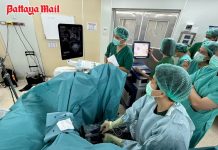There has always been discussion about the advantages of early detection, as far as cancer is concerned. Unfortunately there are still people who say that if you get it, you’ve got it, and you’ve had it. I am not one of those. It isn’t over until the fat lady sings, as they say.
These days there is enough clinical evidence to support the fact that the end results for all cancers show an improved survival rate with early detection and treatment. The same cannot be said for late stage cancers, I am afraid.
In the UK they have actually been studying early detection with the National Cancer Director Professor Mike Richards indicating that work is well underway to catch more cancer cases earlier and improve the longer term treatment for cancer survivors.
Professor Richards said, “Cancer treatment in Britain has improved vastly in recent years and we are now beginning to see the impact on our survival rates. Cancer mortality figures for under 75’s show that 9000 lives were saved in 2007 compared with 1996 and we are on course to meet our target of a reduction of at least 20 percent in cancer death rates by 2015.”
The NHS in the UK, despite its many shortcomings (waiting lists being just one of them), does keep good statistics, and it is statistical analysis which can keep us heading in the right direction. UK Health Minister Ann Keen said, “I welcome the first annual report which details the excellent progress the NHS has made in improving cancer outcomes and services. This is evident in the reduction we have seen in mortality rates and improvement in one-year survival rates. The challenge now is to keep up this momentum and ensure that we continue to make further improvements. We are committed to providing cancer patients with the best possible services to taking action to prevent cancer in the first place and to detecting it at the earliest possible point. The HPV vaccination program, extensions of the bowel and breast screening programs and a new national awareness and early diagnosis initiative will help to make this a reality.”
With breast cancer screening, Jeremy Hughes, Chief Executive of Breakthrough Breast Cancer said, “Breast cancer is the UK’s most common cancer and we have been concerned for some time that women remain unaware of the full range of breast cancer signs and symptoms. At the same time not all women invited to breast screening attend. Breast awareness and screening are key to detecting the disease at the earliest opportunity and we know that the earlier breast cancer is diagnosed the better the chances of successful treatment. Breakthrough looks forward to working with the government to help improve cancer awareness and detection which we hope will improve survival rates.”
With that sage advice, have you, my women readers, had a mammogram and do you regularly practice breast self-examination?
On the common male cancer of the prostate, much work is also being done there, in the field of early detection and grading of tumors. Progress on reducing the mortality rate is firmly linked to the research agenda. Critically important is the need to develop a new generation test capable of distinguishing between aggressive and slow-growing forms of prostate cancer. This could form the basis for a screening program and would enable treatment to be focussed on those men for whom prostate cancer presents a serious risk to health.
Medicine is an ever evolving science, and even though we are currently trying to develop these new screening tests, does not mean that we have nothing at this stage. It may not be the gold standard, but the PSA, and particularly serial PSA’s, can give a usable guideline, especially when correlated with DRE (digital rectal examination) and ultrasound. Some researchers say that the important factor to watch is the rate of change of PSA, rather than the simple PSA level, and I would agree with that. Again a very good reason to get your PSA checked with your annual check-up (which you do have each year, don’t you)!
All males of over 50 and women of over 40 should consider annual examinations. Earlier if there is a poor family history!




